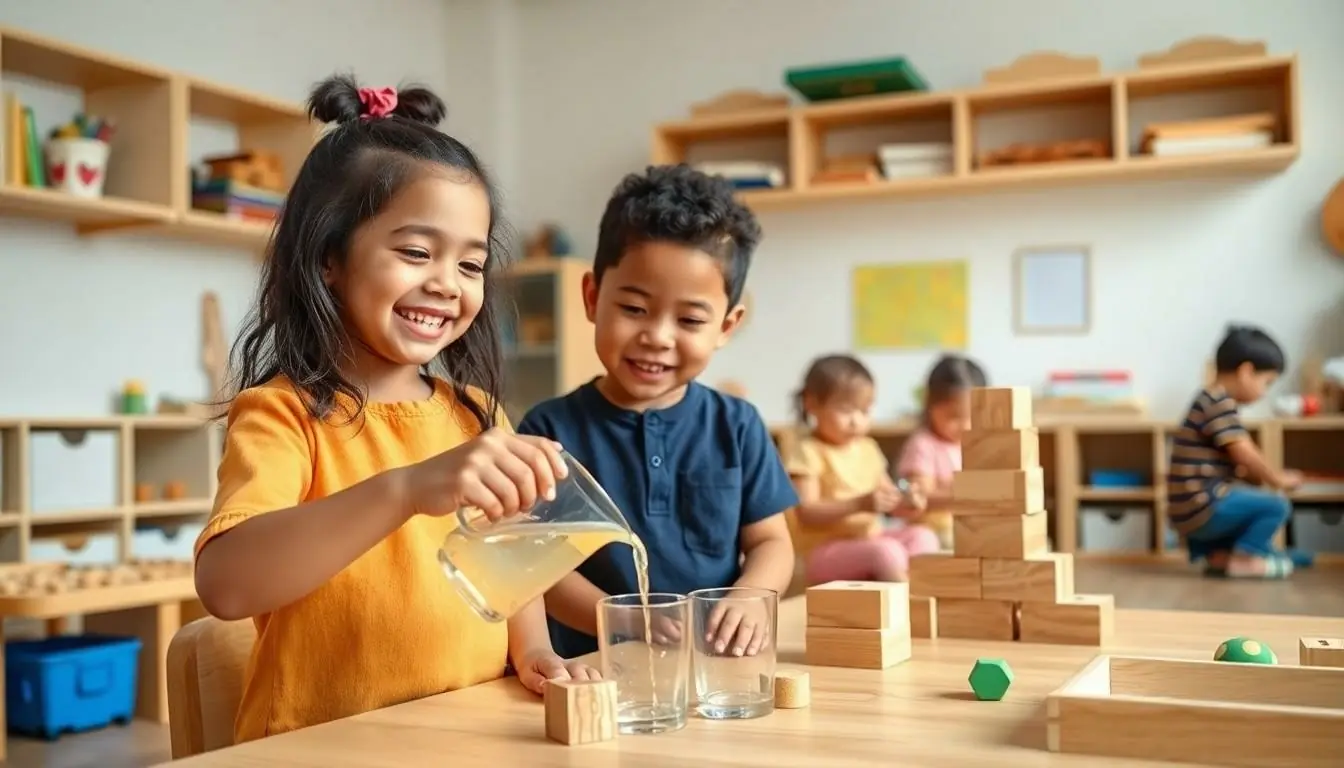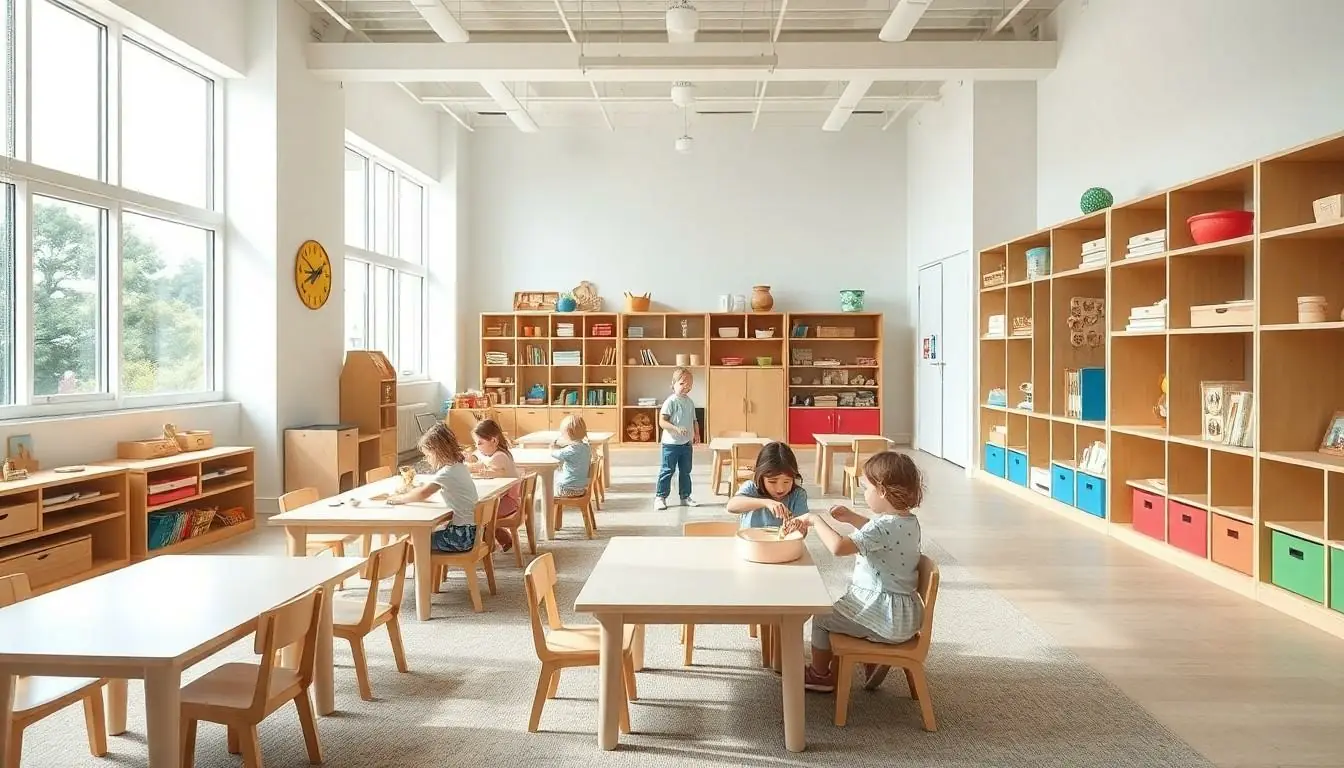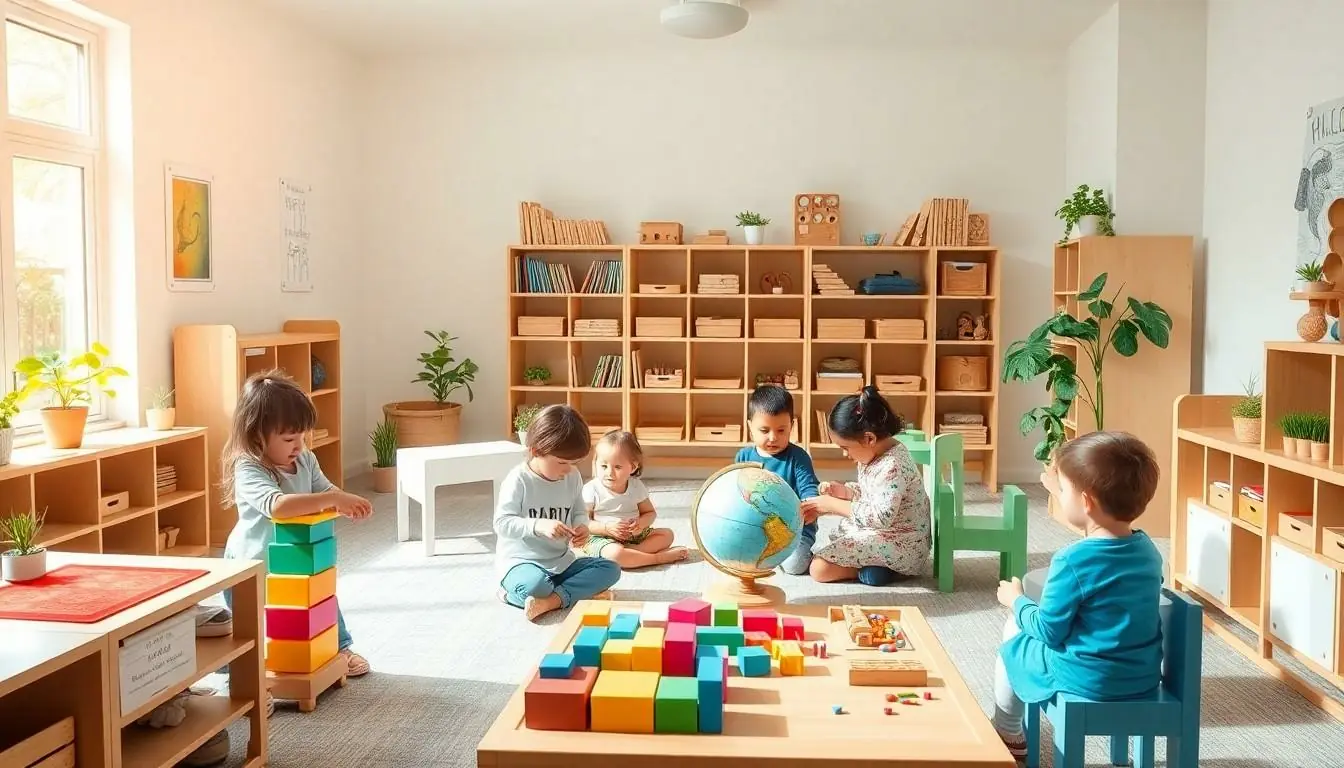Looking for a daycare that doesn’t just babysit but actually helps little ones thrive? Montessori daycare centers offer a unique approach to early childhood education that’s been winning parents’ hearts for over a century. These specialized environments encourage children to explore independently while developing crucial life skills through hands-on learning experiences.
In a Montessori daycare setting kids don’t just play with random toys – they engage with carefully designed materials that promote cognitive development practical skills and social interaction. Unlike traditional daycares where activities are strictly scheduled children in Montessori programs have the freedom to choose their activities and work at their own pace. This child-led approach helps build confidence independence and a genuine love for learning that’ll last well beyond their preschool years.
Table of Contents
ToggleWhat Is Montessori Day Care?
Montessori daycare centers provide early childhood education based on the educational philosophy developed by Dr. Maria Montessori. These specialized learning environments cater to children aged 6 weeks to 6 years through individualized instruction focused on developmental milestones.
Core Principles of Montessori Education
Montessori education operates on five fundamental principles:
- Prepared Environment: Classrooms feature child-sized furniture materials placed at accessible heights
- Mixed-Age Groups: Children of different ages learn together in 3-year age spans
- Freedom of Choice: Students select activities that interest them from designated learning areas
- Hands-on Learning: Materials encourage exploration through touch sight sound movement
- Observation-Based Teaching: Teachers observe each child’s progress to provide appropriate guidance
Teachers act as guides rather than instructors creating environments where children develop independence concentration coordination social skills through self-directed activities.
Key Differences From Traditional Day Care
Montessori daycare differs from conventional programs in several ways:
| Traditional Daycare | Montessori Daycare |
|---|---|
| Teacher-led activities | Child-directed learning |
| Same-age grouping | Multi-age classrooms |
| Structured schedules | Flexible work periods |
| Plastic toys games | Natural wooden materials |
| Group instruction | Individual lessons |
The Montessori environment emphasizes practical life skills including dressing eating cleaning. Children work with specialized materials designed to develop specific abilities in mathematics language sensory awareness cultural studies. Each student progresses at their own pace without competition or artificial rewards.
The Prepared Environment
The Montessori prepared environment features carefully designed spaces that support children’s natural development through purposeful activities. Each element in a Montessori daycare classroom serves specific developmental needs of young children.
Child-Sized Furniture and Materials
Child-sized furniture empowers children to move independently throughout their learning environment. Low shelves display Montessori materials at eye level, enabling easy access to activities like practical life tools, sensorial materials, language materials and mathematical objects. Tables and chairs match children’s proportions, allowing them to sit comfortably while working. Specifically sized items include:
- Lightweight chairs children can carry themselves
- Low sinks for independent hand washing
- Small pitchers for pouring exercises
- Miniature cleaning tools for care of environment
- Child-sized cooking utensils for food preparation
Freedom of Movement and Choice
The prepared environment enables children to move freely and select activities based on their interests. Open floor plans with defined activity areas let children flow naturally between different learning experiences. Children choose from available materials on shelves, determining:
- Which activities to explore
- How long to work with materials
- Where to complete their chosen work
- When to switch to new activities
- Who to work with during social learning
The space includes clear pathways between areas for practical life, sensorial exploration, language, mathematics and cultural studies. Materials remain consistently organized in designated spots, helping children develop independence through predictable organization.
Montessori Learning Activities
Montessori learning activities engage children in hands-on experiences that promote independence, concentration and mastery of essential skills. These activities follow a progressive sequence from simple to complex, allowing children to build confidence through repeated practice.
Practical Life Skills
Practical life activities form the foundation of Montessori learning by teaching children essential self-care and environmental care skills. Young children practice pouring liquids between containers, transferring objects with tongs and spooning dry materials to develop fine motor control. Additional activities include buttoning frames for dressing skills, food preparation tasks like cutting fruits and table setting routines to establish order. Children learn proper hand washing techniques, shoe polishing methods and plant care procedures through step-by-step demonstrations. These exercises enhance concentration, coordination and independence while instilling a sense of responsibility.
Sensorial Development
Sensorial materials enable children to refine their senses through exploration of size, shape, color, texture, sound and weight. The pink tower consists of 10 graduating cubes that help children distinguish visual differences in dimensions. Cylindrical blocks with varying diameters and heights allow children to match shapes while developing visual discrimination. Sound cylinders containing different materials produce distinct sounds for auditory refinement. Touch boards featuring contrasting textures and temperature bottles filled with warm or cool water enhance tactile awareness. Color tablets introduce primary colors progressing to gradients of hue.
Language and Mathematics
Mathematics concepts emerge naturally through concrete materials that make abstract ideas tangible. The number rods introduce quantity by representing units from 1-10 in red and blue sections. Sandpaper numbers provide a tactile experience of numerical symbols. Language development progresses from sound games to sandpaper letters for letter recognition. Metal insets help children develop pencil control for writing. The moveable alphabet enables word building before formal writing begins. Golden bead materials present place value through physical manipulation of units, tens, hundreds and thousands. Three-part cards match objects with labels to expand vocabulary in science, geography and culture.
Benefits of Montessori Day Care
Montessori daycare programs create lasting positive impacts on children’s development across multiple domains. These specialized early learning environments foster growth through carefully designed spaces coupled with research-backed teaching methods.
Social and Emotional Growth
Children in Montessori daycares develop strong social skills through mixed-age classrooms that encourage peer learning. Older students serve as mentors to younger ones, building leadership abilities while younger children gain role models. The environment promotes emotional intelligence as children learn to resolve conflicts independently, practice grace and courtesy through daily interactions. Multi-age groupings allow children to form meaningful friendships beyond same-age peers, enhancing their social awareness. Teachers guide children in expressing feelings appropriately, developing empathy and recognizing others’ emotions.
Academic Readiness
Montessori materials introduce academic concepts through concrete, hands-on experiences that build a solid foundation for future learning. Children explore mathematics using golden beads, number rods and counting frames that make abstract concepts tangible. Language development progresses naturally from phonetic sounds to writing using sandpaper letters and the moveable alphabet. Scientific concepts emerge through classification works, while geography materials foster cultural awareness. This integrated approach helps children internalize academic skills at their own pace without pressure or competition.
Independence and Self-Confidence
The prepared environment empowers children to develop autonomy through accessible materials and child-sized equipment. Students gain confidence by successfully completing practical life activities like food preparation, cleaning and self-care tasks. Freedom of choice allows children to follow their interests, building internal motivation and work habits. The uninterrupted work cycle gives children time to concentrate deeply on chosen activities, leading to mastery experiences. Teachers observe and support each child’s growing capabilities while encouraging problem-solving skills through gentle guidance rather than direct instruction.
Choosing a Montessori Day Care
Selecting an authentic Montessori daycare requires careful evaluation of specific program elements combined with thorough on-site observations. Parents benefit from understanding key Montessori indicators while conducting their search.
What to Look for in a Program
- Certified Montessori teachers with recognized training from AMI or MACTE accredited institutions
- Mixed-age groupings spanning 3-year age ranges (0-3, 3-6 years)
- Complete sets of high-quality Montessori materials arranged on accessible shelves
- Uninterrupted 3-hour work periods each morning
- Child-sized furniture throughout the classroom environment
- Clean orderly spaces with defined areas for different activities
- Low teacher-to-student ratios (1:10 for ages 3-6, 1:4 for infants)
- Written policies aligned with Montessori philosophy
- Observable student independence in daily activities
- Regular parent communication about child development
Questions to Ask During Your Visit
- What Montessori certifications do teachers hold?
- How long are daily work periods?
- How do teachers handle conflicts between children?
- What’s the typical daily schedule?
- How do you assess student progress?
- What’s your policy on transitions between activities?
- How do you communicate with parents?
- What role do teachers play during work time?
- How do you maintain classroom organization?
- What opportunities exist for parent education?
- How do you support toilet learning?
- What’s your approach to discipline?
Conclusion
Montessori daycare offers a transformative approach to early childhood education that sets children up for lifelong success. The carefully prepared environments mixed-age classrooms and hands-on learning materials create an ideal setting for young minds to flourish naturally.
Parents who choose Montessori daycare invest in their child’s future by providing an environment that nurtures independence confidence and a genuine love for learning. Through this unique educational approach children develop essential life skills while progressing at their own pace.
The decision to enroll in a Montessori program can lead to lasting positive impacts on a child’s social emotional and academic development. With proper research and careful evaluation parents can find an authentic Montessori daycare that aligns with their values and supports their child’s natural development journey.




